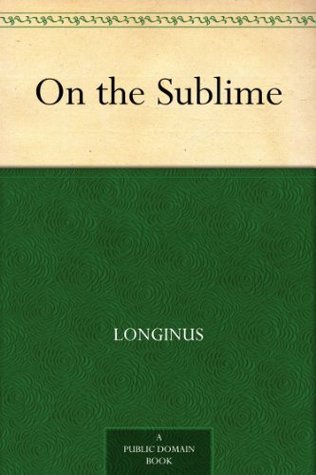What do you think?
Rate this book


46 pages, Kindle Edition
First published January 1, 1

a)figures of thought4)Dignified expression
b)figures of speech
a)diction5)Majesty and elevation of structure
b)metaphors
*Question and answer form
*Asyndeton--a rush of assertions, like “Clashing their shields together they pushed, they fought, they slew, they fell.” --Xenophon
*Mix it up: "continual variation, the intrinsic force of these repetitions and broken clauses, so that this order seems irregular, and conversely this irregularity acquires a certain measure of order."
*Hyperbaton: "By hyperbaton we mean a transposition of words or thoughts from their usual order, bearing unmistakably the characteristic stamp of violent mental agitation." [Especially when hidden: "For art is then perfect when it seems to be nature, and nature, again, is most effective when pervaded by the unseen presence of art."]
*Make plurals into singular for concentration, or singular into plurals to broaden and maximize effect.
*Bring past events to the present tense to create immediacy
*Change of person: Switching to 1st person to relate speech is preferred over "Hector said so and so"
*Paraphrasis to be used carefully and sparingly (rewording a familiar phrase to a novel one)
*Hyperbole, but only when it grows naturally from the subject.
Hence we laugh at those fine words of Gorgias of Leontini, such as “Xerxes the Persian Zeus” and “vultures, those living tombs,” and at certain conceits of Callisthenes which are high-flown rather than sublime, and at some in Cleitarchus more ludicrous still—a writer whose frothy style tempts us to travesty Sophocles and say, “He blows a little pipe, and blows it ill.” The same faults may be observed in Amphicrates and Hegesias and Matris, who in their frequent moments (as they think) of inspiration, instead of playing the genius are simply playing the fool. (5)The commentary is fairly puerile—but as an index of what we do not have: amazing. Longinus there refers to six authors casually, as though we know who they are, but I’d never heard of any of them (unless Gorgias is the same guy with whom Plato fucks mercilessly). I suspect that the only existence any of these writers have now is through references such as this.
It is proper to observe that in human life nothing is truly great which is despised by all elevated minds. For example, no man of sense can regard wealth, honour, glory, and power, or any of those things which are surrounded by a great external parade of pomp and circumstance, as the highest blessings, seeing that merely to despise such things is a blessing of no common order: certainly those who possess them are admired much less than those who, having the opportunity to acquire them, through greatness of soul neglect it. (11)That said, identification of the longinian Sublime relies on pentapartite criteria: grandeur of thought, vigorous passion, artifice, dignity, majesty (13). It can partake of pathos, but need not. And it certainly need not involve the logos:
This striking image, being thrown in by the speaker in the midst of his proofs, enables him by one bold stroke to carry all mere logical objection before him. In all such cases our nature is drawn towards that which affects it most powerfully: hence an image lures us away from an argument: judgment is paralysed, matters of fact disappear from view, eclipsed by the superior blaze. Nor is it surprising that we should be thus affected; for when two forces are thus placed in juxtaposition, the stronger must always absorb into itself the weaker. (36)Rather, it mostly proceeds through deceit, because “it follows that a figure is then most effectual when it appears in disguise. To allay, then, this distrust which attaches to the use of figures we must call in the powerful aid of sublimity and passion. For art, once associated with these great allies, will be overshadowed by their grandeur and beauty, and pass beyond the reach of all suspicion” (41). One should attempt, with audiences, a method that “deceives them into a belief that what is really the result of labour in every detail has been struck out of the speaker by the inspiration of the moment” (43). And “by continual variation, the intrinsic force of these repetitions and broken clauses, so that his order seems irregular, and conversely his irregularity acquires a certain measure of order”; “even so passion rebels against the trammels of conjunctions and other particles, because they curb its free rush and destroy the impression of mechanical impulse” (45). We might be blameless in concluding therefore that dishonesty is the condition of possibility for sublimity.
The same may be observed of two passages in Herodotus: “Cleomenes having lost his wits, cut his own flesh into pieces with a short sword, until by gradually mincing his whole body he destroyed himself”; and “Pythes continued fighting on his ship until he was entirely hacked to pieces.” Such terms come home at once to the vulgar reader, but their own vulgarity is redeemed by their expressiveness. (58)Really? Central problem with the entire thing, of course, is that it deploys an immaterialist’s lexicon (“grandeur of soul,” say (64)) to abstract from a materialist practice, rhetoric. It’s a fairly plain non sequitur, some sort of ideological blindness, easy for us to spot so far down the road. Blindspots also marked out in opposites of the Sublime in ‘effiminate’ (77) and ‘deformity’ (78).
But Longinus' book, taken as a whole, is far from Plato's pessimism. He shows us that great thoughts have been uttered by great men in the past; perhaps they could be uttered again. —D. A. Russell, Introduction
__________
You have asked me to set down a few notes on sublimity for your own use. Let us then consider whether there is anything in my observations which may be useful . . .
the mere capacity of thinking which evidences a faculty of mind transcending every standard of the senses.
the strongest emotion which the mind is capable of feeling.